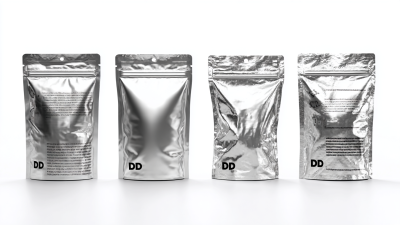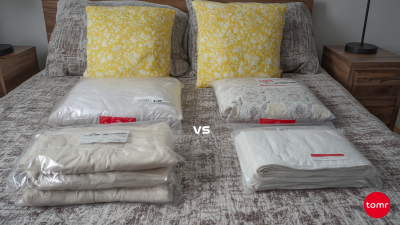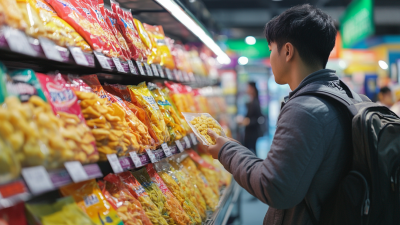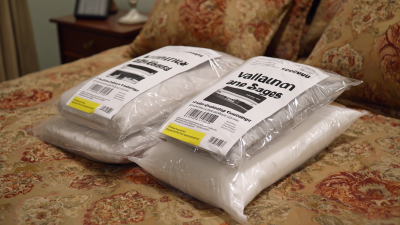The increasing awareness of environmental issues has prompted a significant shift in packaging solutions, particularly in the food and consumer goods sectors. Blank aluminum foil bags, widely recognized for their barrier properties and versatility, have been ubiquitous in various applications. However, according to a recent report by Smithers Pira, the global market for flexible packaging, which includes these bags, is projected to reach $300 billion by 2025, with a growing demand for sustainable alternatives. As businesses search for eco-friendly options to reduce their carbon footprint, innovative materials such as compostable films and biodegradable substrates are emerging as viable substitutes. This blog will explore sustainable alternatives for blank aluminum foil bag solutions, analyzing their feasibility, environmental impact, and the potential shift in consumer preferences towards greener packaging methodologies.

Biodegradable materials are emerging as a compelling alternative in the production of aluminum foil bags, addressing the pressing concerns surrounding environmental sustainability. Traditional aluminum foil bags, while effective in preserving food and beverages, contribute significantly to plastic pollution and waste. By incorporating biodegradable materials, manufacturers can create packaging that decomposes naturally over time, significantly reducing its environmental footprint. This innovation not only helps in keeping our oceans and landscapes cleaner but also aligns with the growing consumer demand for eco-friendly products.
The benefits of using biodegradable materials extend beyond environmental impact. These materials often exhibit comparable, if not superior, barrier properties to conventional aluminum foil, ensuring that products remain fresh and safe for consumption. Moreover, using biodegradable alternatives can enhance brand image and consumer loyalty, as more individuals prioritize sustainability in their purchasing decisions. By adopting these innovative materials, companies can position themselves as leaders in sustainability, making a positive impact while catering to an increasingly eco-conscious market.
This chart illustrates the benefits of using biodegradable materials in aluminum foil bags compared to traditional aluminum foil. The data reflects the environmental impact measured in terms of carbon footprint, biodegradability, and consumer preference.
As the world increasingly prioritizes sustainability, recyclable packaging options for products have emerged as a crucial consideration in packaging solutions. Traditional aluminum foil bags, while effective for preserving product freshness, often contribute to environmental waste. By exploring recyclable alternatives, businesses not only fulfill their environmental responsibilities but also enhance product safety, packaging integrity, and consumer trust. Recyclable materials reduce the carbon footprint associated with production and disposal, leading to a more sustainable lifecycle for products.

Adopting recyclable packaging not only benefits the environment but also aligns with consumer preferences for eco-friendly products. Consumers are becoming more conscious of their purchasing decisions, favoring brands that demonstrate a commitment to sustainability. Recyclable packaging can also provide similar protective barriers as traditional aluminum foil bags, ensuring that the products maintain their quality and safety. By transitioning to sustainable alternatives, companies can differentiate themselves in a competitive market, promote their eco-friendly initiatives, and ultimately contribute to a healthier planet.
The increasing awareness of environmental issues has prompted manufacturers to reevaluate their sourcing methods, particularly in the production of aluminum foil bags. Sustainable sourcing involves selecting materials and suppliers that prioritize eco-friendly practices, thus reducing the overall environmental footprint of the packaging industry. According to a report by Smithers Pira, the global demand for sustainable packaging is expected to reach $500 billion by 2024, highlighting the growing preference for environmentally responsible products among consumers.
In the aluminum foil bag sector, sourcing sustainably not only involves using recycled or recyclable materials but also emphasizes responsible manufacturing processes that minimize energy consumption and waste. Data from the Aluminum Association indicates that using recycled aluminum can save up to 95% of the energy required to produce new aluminum. By opting for suppliers who adhere to these sustainable practices, brands can significantly reduce their carbon emissions and contribute to a circular economy. Furthermore, studies have shown that 72% of consumers are willing to pay more for brands that adopt sustainable practices, making sustainable sourcing not just an ethical choice, but also a strategic business decision.
In recent years, innovative technologies have emerged as critical drivers of eco-friendly packaging solutions, especially in the realm of blank aluminum foil bags. The upcoming 2025 ESG Sustainable Packaging Fair at KINTEX, scheduled for April 22-25, underscores the industry’s commitment to sustainability and ethical management practices. Exhibitors and stakeholders will showcase cutting-edge advancements, including the potential for biodegradable materials derived from biopolymers and plant-based fibers. These innovations are not just environmentally friendly; they also present strategic benefits to businesses aiming to establish greener supply chains, particularly in industries such as pharmaceuticals.
The beverage packaging sector, projecting significant growth in 2025, is taking bold strides toward sustainability by prioritizing the use of eco-friendly materials and innovative solutions. Industry reports highlight a trend where companies are increasingly adopting features like edible packaging and bio-based coatings that not only serve the functional purpose of protection but also enhance the sustainability profile of their products. The integration of smart packaging technology, equipped with real-time freshness sensors, is further setting a new standard for how products can be packaged, promoting reduced waste and an extended shelf life. As these trends evolve, they are set to reshape consumer experiences and the overall packaging landscape dramatically.
| Material Type | Biodegradability | Recyclability | Barrier Properties | Cost Efficiency |
|---|---|---|---|---|
| PLA (Polylactic Acid) | Yes | Yes | Moderate | Moderate |
| PHB (Polyhydroxybutyrate) | Yes | Yes | High | High |
| RPET (Recycled PET) | No | Yes | Good | Low |
| Paper-based Composites | Yes | Yes | Moderate | Moderate |
| Mushroom-based Packaging | Yes | Yes | Variable | High |
As consumers become increasingly aware of the environmental impact of their choices, the demand for sustainable packaging solutions rises. Traditional aluminum foil bags, commonly used in many industries, pose significant challenges due to their non-biodegradable properties and energy-intensive production processes. This growing awareness drives consumers to seek alternatives that not only meet their functional needs but also align with their values towards sustainability.
The future of sustainable packaging choices lies in innovative materials and practices that prioritize both performance and environmental responsibility. Biodegradable films, compostable materials, and reusable packaging options are gaining traction as feasible substitutes for aluminum foil bags. Brands that proactively adopt these alternatives not only reduce their ecological footprint but also appeal to an increasingly eco-conscious consumer base. By making informed decisions, consumers play a crucial role in shaping the market landscape, encouraging companies to invest in greener technologies and practices. The shift towards sustainable packaging is not just a trend; it represents a collective movement towards a healthier planet.







